Solar winter solstice
The solar winter solstice is when the sun's power is at its weakest. The shortest day of the year in the Northern hemisphere is December 21st and in the south, of course, six-months later in June. It is a time of celebration and reflection in many cultures.
Today as I update this page, it is the equinox in both hemispheres; on March 21, the day and night are of equal length all over the planet.
What is really a bit of a contradiction is that because of our long dry winters in South Africa, it is the period when our solar-devices are most effective; at our green home we use almost zero utility power.
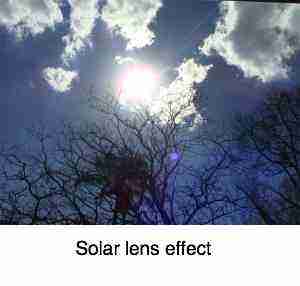
This page was last updated by Bernard Preston on 5th January, 2026.
Solar winter solstice
This week we talk about the winter solstice; that is the shortest day and the longest night of the year.
In the southern hemisphere that is in June; our northern cousins enjoy the long frosty nights just a few days before Christmas.
As is appropriate, the first snows fell on the Drakensberg last Friday and the woodstove heating system has been burning day and night; the beauty of it is that these new designs require very little timber; every last bit is burnt to a fine ash.
Most of that is spread around under the fruit trees but a cup or two is reserved for each of the worm farms; they too prefer an alkaline medium. Some is also used to neutralise the coffee grounds that we use on our compost heaps; it's rather acidic.
Underground rainwater storage
The unexpected winter showers also meant that our reservoir is full; it's paid off handsomely to invest in the best rainwater harvesting model.
Now we have enough water for our home and the winter garden to last us through to the spring rains in August or perhaps September.
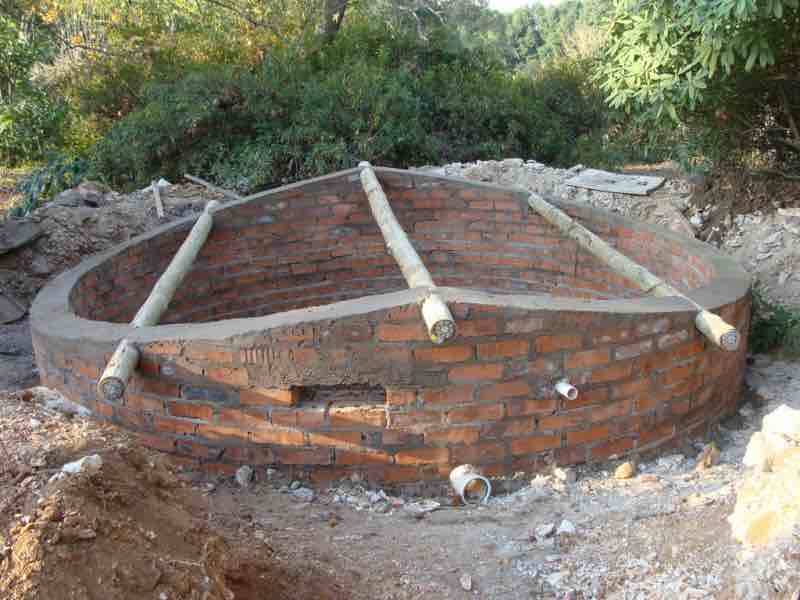
The downside of the winter solstice is that solar power energy is at its bleakest; it is time to get the ladder out and clean both the vacuum tubes that heat our water and the photovoltaic panels that produce electricity. It takes about an hour.
Take care when going up and down ladders onto the roof; many have come a cropper. I lash it to a beam to prevent it from jack-knifing.
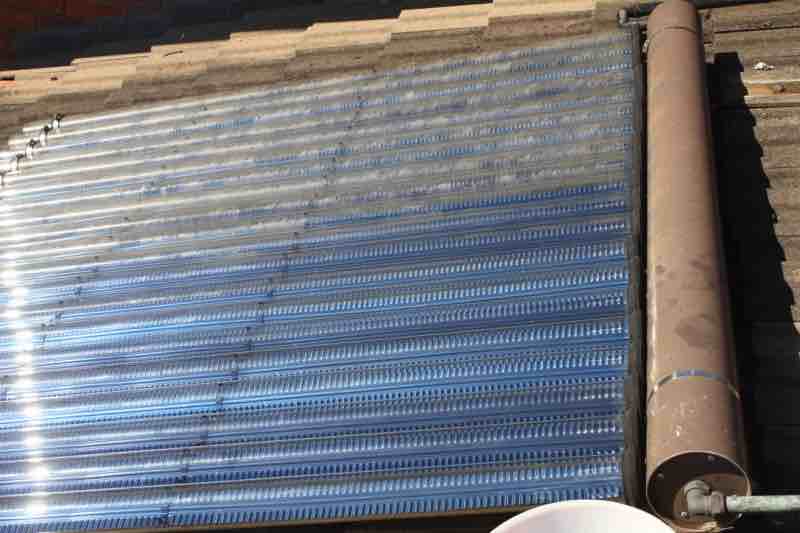 Dirty solar vacuum tubes must be cleaned
Dirty solar vacuum tubes must be cleanedStoring the sun's energy
If rainwater is kept in tanks, cisterns and reservoirs then the sun's energy is stored in batteries.
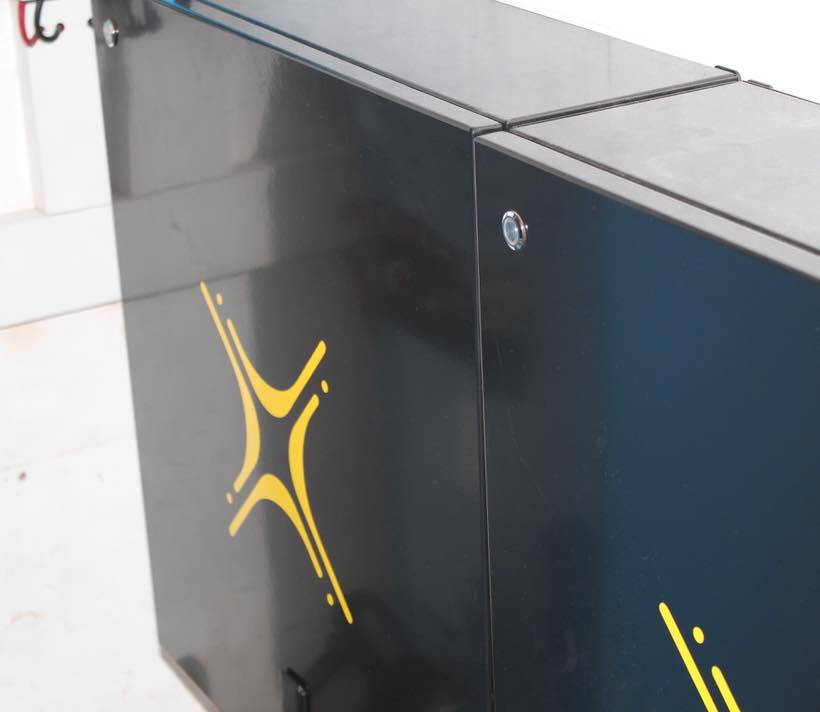
A good investment
I have just checked on the winter solstice day; 89kWh in 65 days, or about 40 per month. That is almost nothing; three dollars, or R35, plus the grid connection fee, of course.
Since writing this we have made three major alterations. We have added another 5kW of PV panels, two lithium batteries and changed over to prepaid electricity. We are now also able to supply our daughter's home. The net result is that we use for both families in two houses about 50kWh costing R80 ($4) per month, only during inclement weather. There is now no connection fee.
And in 2025 after further upgrades we are to all intents and purposes off the grid; we draw a small amount of power during the prolonged 5-day mists that sweep across the escarpment a few times every year.
A solar generator certainly pays its way; best of all we have power during the regular load-shedding that characterises South Africa.
We get a better return on our investment in solar equipment that our money was benefiting from the stock market; and as I write in these times of Covid-19 we are very pleased to have spent some of our capital in this way.
Our green garden
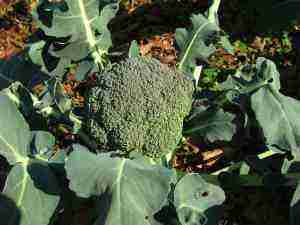
For us here in the very deep south it means a garden loaded with green vegetables like kale, broccoli and spinach; and freshly-harvested peas; Most of them are enjoyed with our salads.
Yes and of course there are several different types of lettuce.
Organic green foods[1] are the richest source of the two wonder carotenes called lutein and zeaxanthin; they are found in very high concentrations in the retina protecting our eyes against incoming damaging radiation.
What's potting in the winter garden is not only a huge saving on tasty food; it also has a marked bearing on whether we will suffer from adult-onset macular degeneration when we get old.
Eggs and yellow corn are good too for the zeaxanthin and beta-carotene.
For you in the far north it means enjoying the last of the winter-squash but having to depend on imported fruit and vegetables.
The material expressed on this page is gleaned from the nutritional and environmental literature; it is clearly referenced. A plain distinction is made between the author's opinion and that which is scientifically proven. When in doubt consult your health professional.
To suggest a correction or clarification, write to Dr Bernard Preston here. Contact.
True wholegrains for bread
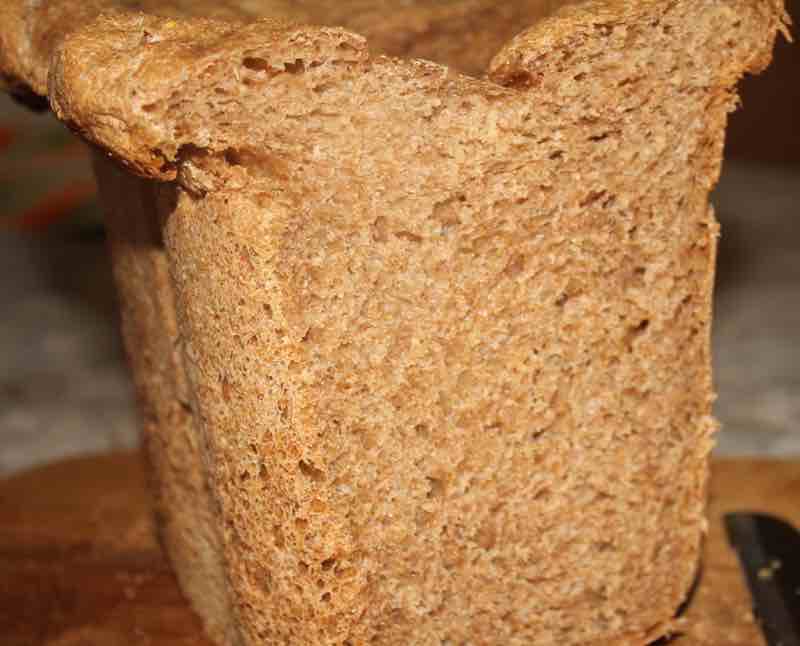 Delicious wholegrain sourdough
Delicious wholegrain sourdoughHopefully all year you have heeded my urging to make your own low GI bread; it is one of the constants that we can do year round to improve our wellness. Use only the complete grains made from the entire seed. Look out for 100 percent wholemeal; it is an excellent source of choline, an important vitamin that Western man gets only half of the recommended dietary allowance.
A whole grain consists of the endosperm that white flour is made, bran which is the fibre and the germ where the precious oil, vitamins and minerals are found in the main.
To be called a whole grain, these should exist in the same ratio as in the seed but millers cheat and the spurious rules allow them to call it wholemeal provided no more than 40 percent of the wheat has been extracted; that is the bran and germ. The "hominy chop" is sent for hog food. The lucky pigs get it all and we have to pay for the supplements at the health store.
The only solution if you bake your own bread, is an electric flour mill; if you use it daily even the Rolls Royce will pay for itself within two years. Our Hawo is nearly twenty-five years and has worked with nary a hiccough.
The broad bean season
The solar winter solstice in mild climates is the height of the most blessed broad bean season; if you suffer from a tremor and are fearful of Parkinson's Disease. These legumes are the only source of the L-dopa that will quieten those shakes.
Such is the relief that I get from these fava beans as they are called in Europe that I freeze them so I can enjoy a few every single day. My experience confirms what the researchers are saying; that they actually serve to prevent the onset and progression of the disease.
They are unique in another way too; they are the only protein from the vegetable kingdom that contains all the essential amino acids.
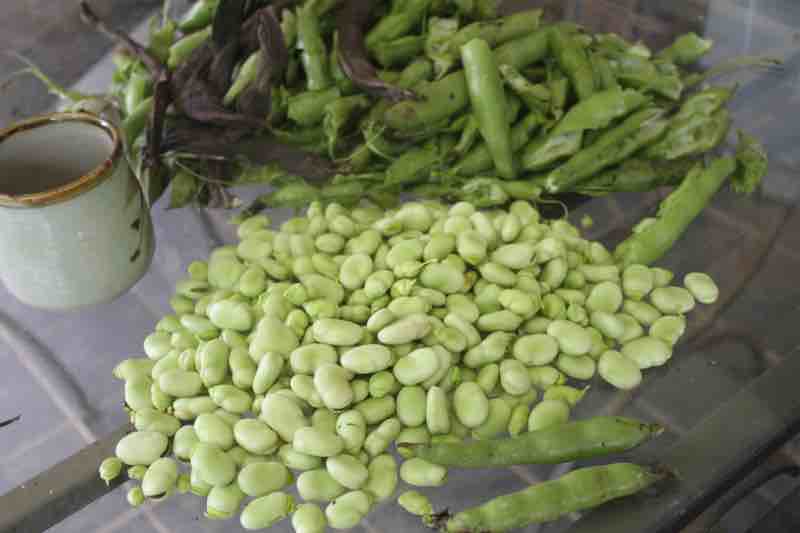 Broad beans from just two plants
Broad beans from just two plantsThere are two kinds of fava beans; one that flourishes in hot weather, the other in the cooler climes. No person on the whole planet should ever suffer from kwashiorkor, a deadly disease caused by protein deficiency. These legumes are easy to grow and so prolific as you can see.
Solar winter solstice
Solar winter solstice is when some still dance around the apple trees, urging them to produce more fruit; sipping their cider and hot gluhwein in memory of a forgotten era. "Up with your roots" is how those that will not perform are threatened.
It is also no coincidence that Christmas lies as close to the longest night as the ancients could place it; Jesus was actually born in April or May according to astronomers.
Newsletter
Our newsletter is entitled "create a cyan zone" at your home, preserving both yourself and Mother Earth for future generations; and the family too, of course. We promise not to spam you with daily emails promoting various products. You may get an occasional nudge to buy one of my books.
Here are the back issues.
- Lifestyle and ideal body weight
- What are ultra-processed foods?
- Investing in long-term health
- Diseases from plastic exposure
- Intensive lifestyle management for obesity has limited value
- A world largely devoid of Parkinson's Disease
- The impact of friendly bacteria in the tum on the prevention of cancer
- There's a hole in the bucket
- Everyone is talking about weight loss drugs
- Pull the sweet tooth
- If you suffer from heartburn plant a susu
- Refined maize meal and stunting
- Should agriculture and industry get priority for water and electricity?
- Nature is calling
- Mill your own flour
- Bake your own sourdough bread
- Microplastics from our water
- Alternative types of water storage
- Wear your clothes out
- Comfort foods
- Create a bee-friendly environment
- Go to bed slightly hungry
- Keep bees
- Blue zone folk are religious
- Reduce plastic waste
- Family is important
- What can go in compost?
- Grow broad beans for longevity
- Harvest and store sunshine
- Blue zone exercise
- Harvest and store your rainwater
- Create a cyan zone at your home
A pagan Christmas
Christmas for most has become a pagan celebration, dancing around the fir-tree; with dozens of presents, drinking and gorging ourselves like gluttons.
Rather let us be looking to forging family relationships than spending vast amounts of money on presents that are neither needed nor desired. One mindfully chosen gift is appreciated far more. We advocate foregoing gifts for a whole year and saving for a solar farm instead.
Remember too the lonely and miserable; Christmas for so many is a time of deep depression with families divided and lost.
It is a time too for real relaxation and perhaps a short holiday; most of us work far too hard and this is the time for a break from the daily-grind, whilst thinking forwards to what the new year will hold.
As I write during the coronavirus epidemic in 2020, we are again reminded in part of the real value of an annual lockdown of sorts; we have thrived in this time of enforced rest and relaxation, with a garden full of food to feed us.
"Rush and hurry are not of the devil; they are the very demon himself."
- Carl Jung
Harvesting firewood and the daily walk through the veggie patch is for us forms of forest bathing; the Garden Cathedral is where we commune with the eternal and find peace from the hustle and bustle of every day life.
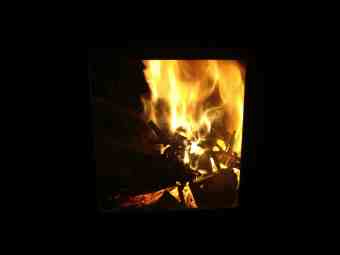
Bernard Preston
Bernard Preston is a retired DC with a passion for the kingdom of heaven; and the legacy we will leave our children on earth. He does not dance around the solar winter solstice apple tree, nor the yew or pine; rather he looks to family values and the cares of the lonely and lost.
One of our fundamental Christian duties must surely be to honour God's creation; but this is how mankind is doing it.
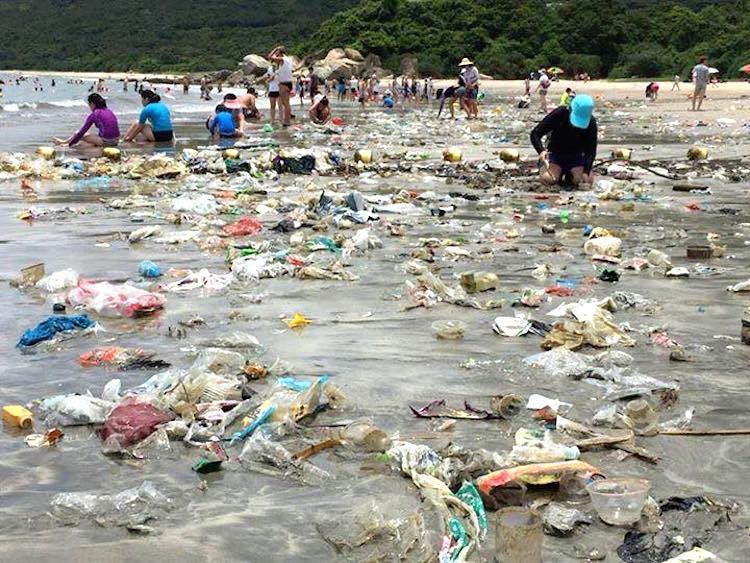
It is hard to know where to start with the the problems being so complex; but weaning off plastic is certainly one good place to begin.
When browsing use right click and "Open Link in New Tab" or you may get a bad gateway signal.
Did you find this page interesting? How about forwarding it to a friendly book or food junkie? Better still, a social media tick would help.
Address:
56 Groenekloof Rd,
Hilton, KZN
South Africa
Website:
https://www.bernard-preston.com